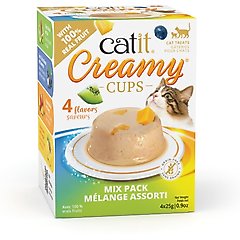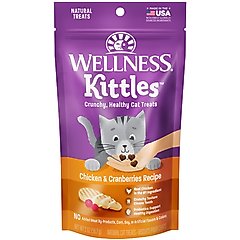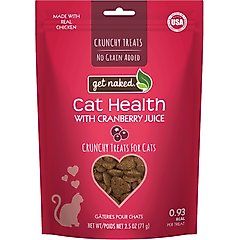Can Cats Eat Grapes?

Photo by Chewy Studios
Grapes are a popular snack for humans, but can cats eat grapes safely? While they might seem harmless, grapes are one of several foods that can pose serious health risks to cats, even in small amounts.
To help you understand the risks, we spoke to a veterinarian expert who explains why cats shouldn’t eat grapes and what could happen if they do.
Before introducing any new food into your cat’s diet, always check with your veterinarian.
Can Cats Have Grapes?
No, cats can’t have grapes.
Grapes have been linked to kidney issues in pets, and while the exact cause isn’t fully understood, experts believe tartaric acid or its salts may be to blame. Most of the data comes from dogs, but vets recommend keeping grapes—and raisins—away from cats to avoid any potential risk.
What Kinds of Grapes Should Cats Avoid?
Cat should avoid all grapes, raisins, and currants (and products that contain them). That includes:
- Red, green, black, purple, and any other color grape: All grape varieties may contain potentially toxic compounds and should be kept away from your cats.
- Grapes with seeds: Grapes with seeds can still be toxic, plus the seeds can be a choking hazard for your cat.
- Cooked grapes, raisins, and currants: Even cooked or dried, grapes, raisins, and currants may still be toxic. Don’t feed your pet any dishes that might contain grapes or a grape derivative.
- Grape products, like jams, jellies, and juices: Also avoid raisin bread, fruit sauces, and raisin desserts such as cakes and cookies.
- Organic grapes: While organic grapes may be sprayed with fewer chemicals, they may still contain the toxic compound found in conventional grapes.
Why Are Grapes Bad for Cats?
Grapes can potentially bring on toxicosis, as well as rapid development of kidney failure, says Rachel Barrack, DVM, CVA, CVCH, and owner of New York City-based veterinary practice Animal Acupuncture.
Experts are still trying to figure out exactly which substance in grapes poses a risk to cats and dogs, but tartaric acid, the primary fruit acid in grapes, and its salt, potassium bitartrate, are the most likely culprits.
But even though we don’t know exactly how the toxicity works, pet parents should assume that grapes in any amount are poisonous to cats.
Grapes pose some other risks, too, including:
- Choking hazard: Grapes are small, round, and slippery, making them a potential choking risk, especially for cats who like to play with food.
- Upset stomach: Even if toxicity doesn’t occur right away, grapes can still cause gastrointestinal distress, like vomiting or diarrhea, especially if your cat eats them.
My Cat Ate a Grape—What Do I Do?
If your cat eats a grape, contact your primary care veterinarian immediately, even if you don’t see symptoms, says Dr. Barrack. Because toxic reactions to grapes progress swiftly, you want your cat treated as soon as possible.
Try to determine how many pieces of fruit your cat may have eaten. And if you can’t reach your veterinarian, call the Pet Poison Helpline (855-764-7661, a fee applies) for advice on next steps.
If your cat is already showing symptoms, like vomiting, diarrhea, or lethargy, bring them to your nearest emergency vet as soon as possible.
How Can I Prevent My Cat From Eating Grapes?
Grapes should always be kept far out of paw’s reach. That means storing them securely and staying alert when snacking on them near your cat.
Use these tips to help keep your cat safe:
- Don’t leave grapes in a spot your cat can access. Keep grapes in the fridge and raisins and currants in cat-proof bags or sealed containers that your smart feline can’t open. Grocery bags containing grapes shouldn’t be left out either—curious cats are quick to investigate.
- Watch the table scraps. This is especially important during the holidays when grape- and raisin-filled treats tend to show up on counters and tables.
- Don’t treat grapes like toys. Grapes are little and might seem like a fun item to toss around with your best bud, but they’re not safe for play and shouldn’t be used to entertain your cat.
- Quickly pick up dropped grapes. If you or another family member happen to drop grapes on the floor, pick them up right away.
What Fruits Can Cats Eat?
While grapes are a no-go, cats can eat a wide variety of fruits. But even though many fruits aren’t toxic to purr babies, it doesn’t make them the best choice.
For optimal health and wellness, cats need mostly protein from meat-based cat food. Reserve fruit just for occasional treats. And remember: All treats combined (including fruit) should make up no more than 10% of your cat’s daily calorie intake.
With that in mind, there are several fruits that, in moderation, are safe for your little gourmand, including:
- Apples and pears (peeled and without seeds)
- Berries, such as blueberries, strawberries, raspberries, cranberries, and blackberries
- Seedless watermelon
- Mangos
- Pineapples
- Apricots
- Honeydew
- Nectarines
- Bananas
Or you can opt for fruit-flavored cat treats. Here are some pet-parent approved options:
Recommended Products
FAQs About Cats and Grapes
Q: Why does my cat love grapes?
A: Part of the reason cats love grapes is because they’re toy-sized and easy to bite. They also have an interesting feel and appearance that can draw your cat’s attention.
Q: Can cats eat green grapes?
A: No, cats shouldn’t eat green grapes. Grapes (of any color) can be toxic to cats and may lead to serious health issues like kidney failure.
Q: Can cats eat grape stems?
A: Grape stems are also a no-go for cats. They can pose a choking hazard and may have the same toxins found in grapes themselves.
Q: Can cats have grape jelly?
A: No, cat can’t have grape jelly. Not only are the grapes bad for cats, but jelly is also high in sugar and other potential additives that aren’t ideal for your kitty.






